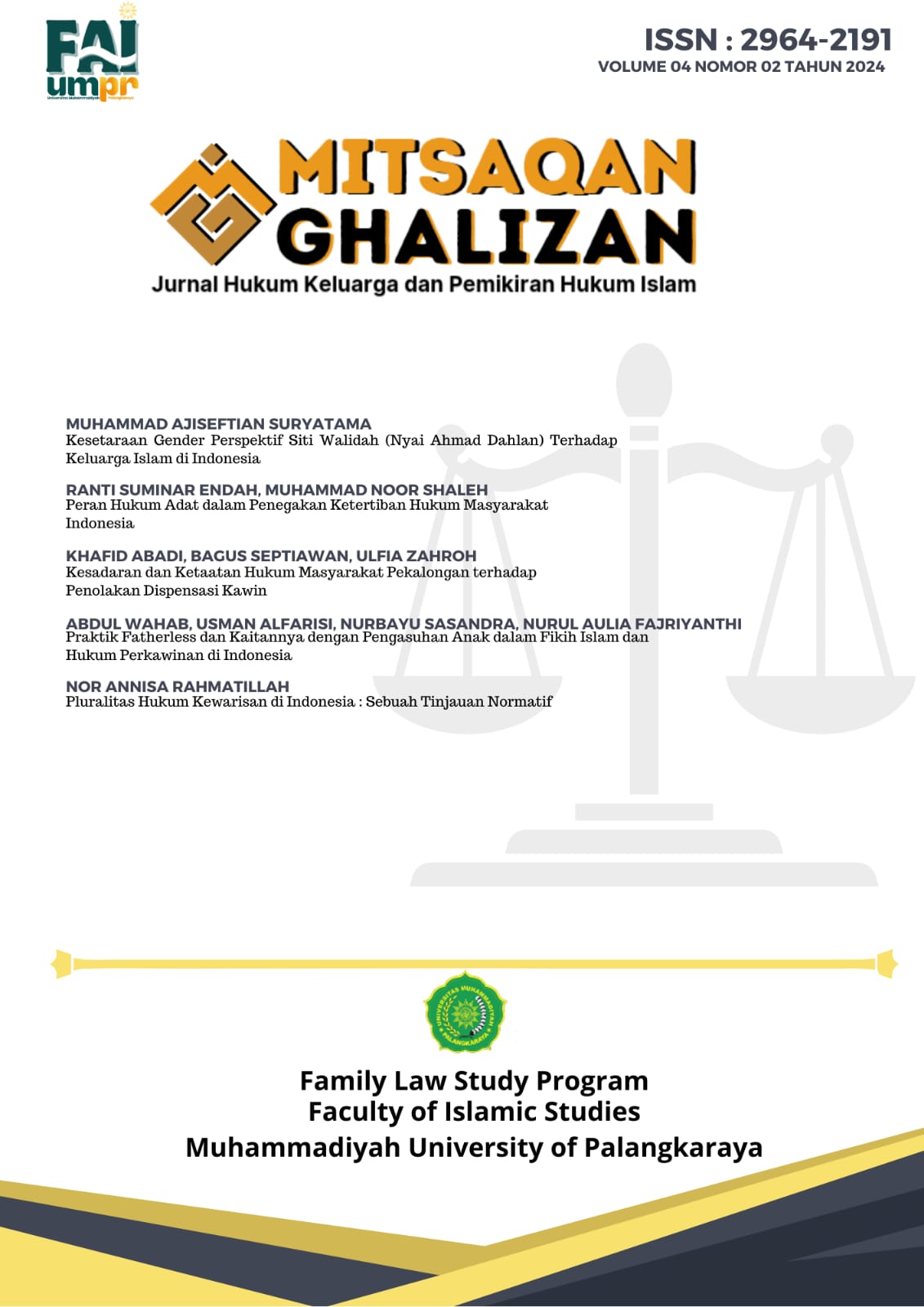PRAKTIK FATHERLESS DAN KAITANNYA DENGAN PENGASUHAN ANAK DALAM FIKIH ISLAM DAN HUKUM PERKAWINAN DI INDONESIA
Main Article Content
Abstract
The phenomenon of fatherless, which is increasingly prevalent in Indonesia, has become a serious concern due to its negative impact on children’s development, both physically, mentally, and spiritually. This study aims to analyze the perspective of Islamic Fiqh and the Marriage Law regarding the role of fathers in child care, identify the father’s obligations in child care according to Islamic Fiqh and the Marriage Law, and determine the impact of fatherless practices on child growth. This study uses a library research method with a qualitative approach. The data used are primary data and secondary data obtained from various sources of literature, such as books, journals, and official documents. Data collection techniques were carried out through literature studies, and data analysis used content analysis. The results of the study show that Islamic Fiqh and the Marriage Law in Indonesia both emphasize the importance of the father’s role in child care. Fathers have an obligation to provide sustenance, educate and guide children, as well as provide affection and attention. However, fatherless practices in Indonesia are caused by several factors, such as high divorce rates, unbalanced parenting patterns, patriarchal culture, and the death of the father. The impact of fatherless on children’s growth and development can be in the form of father hunger, which is a condition of psychological damage that results in low self-esteem, difficulty adapting, slow psychological maturity, difficulty managing emotions, and lack of decision-making ability.
Downloads
Article Details

This work is licensed under a Creative Commons Attribution-ShareAlike 4.0 International License.
References
Artikel “Kewajiban Orang Tua terhadap Anak.” Yatim Mandiri. Accessed August 25, 2024. [Tautan ke Artikel]
Fitroh, Siti Fadjryana. “Dampak Fatherless Terhadap Prestasi Belajar Anak.” Jurnal PGPAUD Trunojoyo 1, no. 2 (2014): 85.
Hidayatullah, Muhammad Fahmi. “Paradigma Pendidikan Keluarga: Supervisi dan Motiv Keterlibatan Orang Tua dalam Pelaksanaan Ibadah.” Jurnal Tarbiyatuna: Kajian Pendidikan Islam 2, no. 1 (2018).
Hukum Online. “Undang-Undang Republik Indonesia Nomor 23 Tahun 2002 tentang Perlindungan Anak.” Accessed August 25, 2024. https://www.hukumonline.com/pusat-hukum/uu/detail/lt50276976/undang-undang-republik-indonesia-nomor-23-tahun-2002-tentang-perlindungan-anak.
Hukumonline. “Ini Langkah untuk Mengasuh Anak Saudara Secara Sah.” Accessed August 25, 2024. https://www.hukumonline.com/klinik/detail/baca/lt59721844/ini-langkah-untuk-mengasuh-anak-saudara-secara-sah.
Indonesia. “Peraturan Pemerintah RI Nomor 44 Tahun 2017 tentang Pelaksanaan Pemgasuhan Anak.” Accessed August 25, 2024. https://jdih.kemenpppa.go.id/produk_hukum/peraturan_pemerintah/peraturan_pemerintah_nomor_44_tahun_2017_tentang_pelaksanaan_pemgasuhan_anak.
Indonesia. Undang-Undang Nomor 4 Tahun 1979 tentang Kesejahteraan Anak. Accessed August 25, 2024.
Jarot Winarko, Ir., M.pd., Dkk. “Intim Orangtua – Anak.” Father and Son 2, Keluarga Indonesia Bahagia, tt., 7.
Munjiat, Siti Maryam. “Pengaruh Fatherless terhadap Karakter Anak dalam Prespektif Islam.” Al-Tarbawi Al-Haditsah: Jurnal Pendidikan Islam 2, no. 1 (2017): 111.
Rahman, Nandang Fathur. “PERBANDINGAN KEWAJIBAN NAFKAH MENURUT HUKUM ISLAM DAN HUKUM POSITIF DI INDONESIA.” Al-Ahwal Al-Syakhsiyyah: Jurnal Hukum Keluarga dan Peradilan Islam 3, no. 2 (2022): 194.
Republik Indonesia. Undang-Undang Republik Indonesia Nomor 1 Tahun 1974 tentang Perkawinan (UU 1974). peraturan.bpk.id (Home page).pdf.
